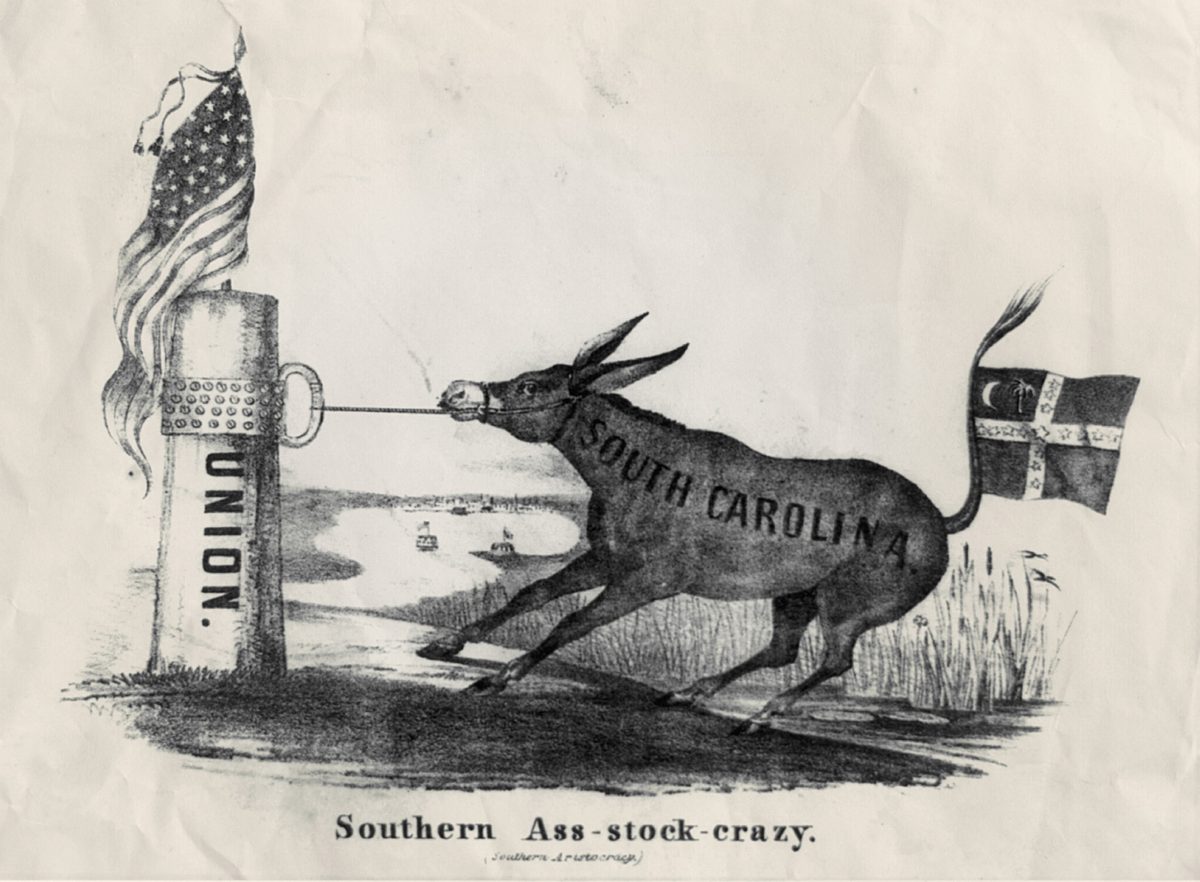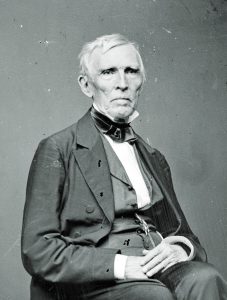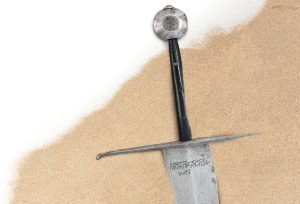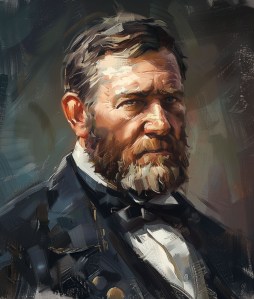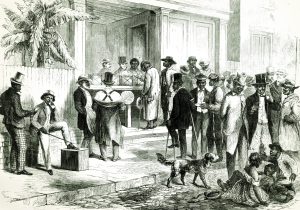The United States came perilously close to civil war during the 1832 Nullification Crisis. After Congress passed a high protective tariff in May 1828, dramatically increasing taxes on many imported goods, protests erupted across the South—growing particularly violent in South Carolina. Hurt by a decade of economic decline and a series of slave panics, many South Carolinians considered the tariff a plot to impoverish the South and undermine slavery. Many championed nullification, insisting that states had the power to declare federal laws null and void. The most radical Nullifiers went even further, calling for outright disunion and armed resistance.
Nullifiers won control of the General Assembly in 1830, and just two years later held a commanding three-fourths majority. The state’s governor, senators, and most congressmen were also Nullifiers. In November 1832, a state convention issued the Ordinance of Nullification, declaring the tariff unconstitutional and threatening to secede if the federal government moved to enforce it. Nullifiers mobilized for war, with 25,000 men volunteered to defend their state against federal “tyranny.” As one volunteer proclaimed, “the fact is now probably obvious that we must fight.”
Yet South Carolina was starkly divided, with 40 percent of voters—generally older men, those owning fewer slaves—fiercely opposed to nullification. In their view, the Union was a bold but fragile democratic experiment, the “last hope of liberty” in a world ruled by kings and emperors—that nullification would prove humanity was incapable of self-government.
Among these “Union” men was William McWillie, a state legislator from Camden. Born in 1795, he had served in the War of 1812 and was admitted to the bar in 1818. A planter who owned nearly 200 enslaved laborers, he reportedly considered “the law more a pastime than a profession.” Elected to the General Assembly in 1829, he would spend several years, however, arguing against nullification. His oratory skills particularly shone during a December 1830 debate on whether a state convention should be called to nullify the tariff. The “hopes of mankind,” he argued, rested on survival of the Union.

Mr. Chairman—I agree to the fullest extent…as to the importance of the resolutions now submitted to the consideration of the committee; not only to this state, but to the United States; and perhaps to the world. The subject overwhelms me….
When we nullify, I am persuaded, it will be the beginning of violence, and this republic will be no more. Have we come to this? Are we prepared to say we will no longer be called the countrymen of Washington; and that the history of the revolution and [the War of 1812] shall no longer be our history? Are we prepared to say, that the eagle, the emblem of our national glory, shall no longer be our eagle? That our beautiful standard, the standard of stars and stripes, emblematical of the union of these states, shall no longer be our standard? Are we prepared to discard this standard, with which is associated all that we have of national character, and around which our fathers rallied when they drove the proud oppressors from our shores: that standard which has floated broad and high, triumphant and glorious in the rush of many a fight, where the strongest of our countrymen have striven, and the bravest have bled? Can we deface its honors? Will we trample it in the dust? Shall all that has been said of it in rhetoric, in poetry and in song, be heard no more? No. I at least for one, must answer no—of this my conscience will be clear….
We have been told [by Nullifiers] that the object of the north and west is to emancipate our slaves, to destroy our property. This is an argument I did not expect to hear in this house. It is a subject, although a slaveowner, on which I have no apprehensions…I have no fears in this matter from the general government; but I have sometimes feared the effect of our own madness and temerity. If any thing would be likely to destroy the value of this property, it would be disunion and civil war. We might then hear the shout of liberty, from quarters which would appal [sic] the stoutest hearts. We might realize the horrors of St. Domingo; where the labours of man, the monuments of art, where infancy and age; woman’s feebleness and man’s strength, were swept away in one vast, overwhelming tide of blood…
We have been told that our government is the most positive despotism on earth—and that our people are the most oppressed. Can this be true? Has my life been all one delusion? When in the midst of revelry and of songs, the joyous acclamations of freemen, and the thunder of artillery, I have celebrated her triumphs and her glory—was I deluded? Were manacles then upon my hands, and did I bow at the feet of despotic power? Was I a slave? No! I was then as I now am, a freeman; a citizen of this happy, vast and powerful republic; an American citizen….
I would ask this committee, if…our beautiful and happy institutions, on which rest not only our own national character and glory but the hopes of mankind, are to be permitted now to perish? Is man destined ever to be the slave of legal forms? Is liberty but an ignis fatuous gleam…ever to be pursued, but never to be grasped? I trust not—I believe that man is capable of self government—it is for us…to prove the fact—it is for us to assert the dignity of his nature, and shew his capacity for self control. God grant that the predictions of our enemies may not be fulfilled—but that our government, the world’s last hope, may continue forever in her onward course; and that her example may be to the enslaved nations of the earth, like the pillar of cloud by day, and of fire by night; conducting them to happiness and freedom….
If the American people are true to themselves, this will be. Our fields shall ever brighten under their golden harvests; our commerce shall press the bosom of every sea; our armies shall hurl back the invaders strength; and our fleets, whitening the heavens with their canvass, shall sweep the ocean with the thunder of their cannon….
Oh God! Let my country live to see this… consummation, in which all the fond hopes of the patriot’s heart shall be lost in the fulness of fruition; and that we, as one people, may go forward, gloriously and forever with freedom’s soil beneath our feet, and…the broad and glorious banner of stars and of stripes, the banner of the union, proudly streaming o’er us.
Nevertheless, in 1832, state officials passed an Ordinance of Nullification to bring the nation closer to civil war. In reply, about 9,000 South Carolinians joined paramilitary Union Societies, vowing to fight even their own friends and neighbors. Congress defused the crisis in March 1833, agreeing to lower tariff rates over the next nine years. But even when the ordinance was voided, tensions remained high. “[T]he tariff was only their pretext,” Jackson wrote, “and disunion and a Southern confederacy the real object. The next pretext will be the negro, or slavery, question.”
Having moved to Mississippi, McWillie was elected to Congress in 1849. Amid another sectional crisis in 1850, he pledged enduring devotion to the Union, although he was quick to blame Northern abolitionists rather than Southern radicals for endangering the country. As governor of Mississippi in 1857-59, however, he pledged to dissolve the Union rather than surrender slavery.

